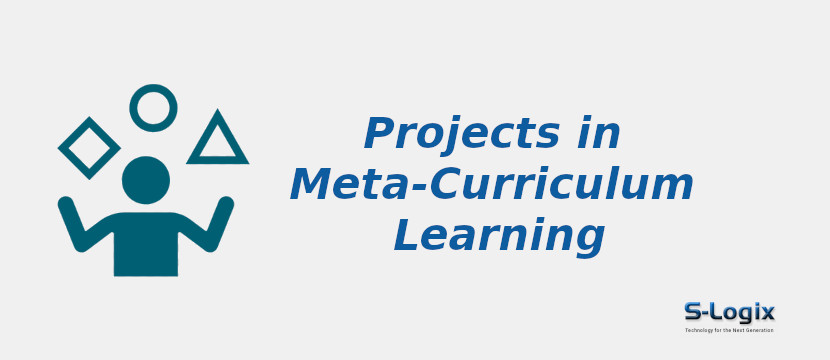Project Background:
Meta-curriculum learning is a framework within machine learning that aims to enhance the learning process by dynamically adjusting the curriculum or sequence of training examples presented to the learner. The project background of meta-curriculum learning involves understanding the limitations of traditional static curricula in machine learning, often presenting examples in a fixed order or random sequence. In contrast, meta-curriculum learning seeks to leverage meta-learning techniques to adaptively tailor the training curriculum based on the learner progress, preferences, and learning dynamics. By dynamically adjusting the curriculum, meta-curriculum learning can optimize learning efficiency, promote faster convergence, and improve generalization performance across a wide range of tasks and domains.
The project explores the theoretical foundations, algorithmic frameworks, and practical applications of meta-curriculum learning in various machine learning settings, including supervised reinforcement and unsupervised learning. Overall, the work of meta-curriculum learning lays the foundation for developing innovative approaches to curriculum design and optimization in machine learning, potentially significantly enhancing learning outcomes and advancing the state-of-the-art in artificial intelligence.
Problem Statement
- Traditional static curricula in machine learning present training examples in a fixed order or random sequence, which may not be optimal for learning efficiency or performance.
- Static curricula may not adequately balance the distribution of training examples across different concepts or difficulty levels, leading to suboptimal learning outcomes.
- Fixed curricula may not effectively adapt the difficulty of training examples to the learners skill level, resulting in overly challenging or trivial tasks that hinder learning progress.
- Static curricula do not account for individual differences in learning styles, preferences, or learning dynamics, limiting the adaptability of the learning process to suit the needs of different learners.
- The fixed presentation order of training examples may not facilitate optimal generalization to unseen data or tasks, leading to reduced performance on real-world applications.
- Fixed curricula may result in inefficient use of computational resources, as training examples that are irrelevant or redundant to the learner current knowledge are still presented, wasting time and computational power.
Aim and Objectives
- Develop a theoretical framework for meta-curriculum learning that incorporates principles from meta-learning, curriculum learning, and adaptive learning systems.
- Design algorithms and methodologies for dynamically adjusting the curriculum based on the learners progress, preferences, and learning dynamics.
-
Explore strategies for curriculum generation, including curriculum balancing, difficulty progression, and adaptation to individual learner characteristics.
- Develop evaluation metrics and benchmarks for assessing the effectiveness of meta-curriculum learning techniques in improving learning efficiency and performance.
- Investigate the practical applications of meta-curriculum learning in various machine learning tasks and domains, including supervised learning, reinforcement learning, and unsupervised learning.
- Conduct empirical studies and experiments to validate the effectiveness and scalability of meta-curriculum learning techniques on benchmark datasets and real-world applications.
- Explore the potential benefits of meta-curriculum learning for transfer learning and domain adaptation, where adaptive curriculum design can facilitate knowledge transfer and retention across different tasks and environments.
Contributions to Meta-Curriculum Learning
- Involves the formulation of theoretical frameworks that integrate concepts from meta-learning, curriculum learning, and adaptive learning systems, provide a conceptual basis for understanding the principles and guide the development of new algorithms and methodologies.
- Focus on developing evaluation metrics and benchmarks for assessing the effectiveness of meta-curriculum learning techniques, efficiency, generalization performance, and other relevant factors, enabling rigorous empirical evaluation and comparison of different approaches.
- Include empirical studies and experiments that validate the effectiveness and scalability of meta-curriculum learning techniques on benchmark datasets and real-world applications, providing empirical evidence of their benefits and limitations.
- Explore the practical applications of meta-curriculum learning in various machine learning tasks and domains to demonstrate the effectiveness of adaptive curriculum design techniques in improving learning efficiency and performance across different learning scenarios.
- It may also involve theoretical analysis and insights into the properties and behavior of meta-curriculum learning algorithms to provide a deeper understanding of the mechanisms driving adaptive curriculum design into the factors influencing its effectiveness.
Deep Learning Algorithms for Meta-Curriculum Learning
- Meta-Curriculum Learning with Deep Q-Networks (DQN)
-
Meta-Curriculum Learning with Deep Reinforcement Learning (DRL)
-
Meta-Curriculum Learning with Convolutional Neural Networks (CNN)
-
Meta-Curriculum Learning with Recurrent Neural Networks (RNN)
-
Meta-Curriculum Learning with Generative Adversarial Networks (GAN)
-
Meta-Curriculum Learning with Transformer Models
-
Meta-Curriculum Learning with Autoencoders
-
Meta-Curriculum Learning with Variational Autoencoders (VAE)
-
Meta-Curriculum Learning with Graph Neural Networks (GNN)
-
Meta-Curriculum Learning with Capsule Networks
Datasets for Meta-Curriculum Learning
- MNIST
-
CIFAR-10
-
ImageNet
-
Fashion-MNIST
-
COCO
-
LSUN (Large-Scale Scene Understanding)
-
LFW (Labeled Faces in the Wild)
-
CelebA
-
SVHN (Street View House Numbers)
-
OpenAI Gym environments
Software Tools and Technologies:
Operating System: Ubuntu 18.04 LTS 64bit / Windows 10
Development Tools: Anaconda3, Spyder 5.0, Jupyter Notebook
Language Version: Python 3.9
Python Libraries:
1. Python ML Libraries:
- Scikit-Learn
- Numpy
- Pandas
- Matplotlib
- Seaborn
- Docker
- MLflow
2. Deep Learning Frameworks:
- Keras
- TensorFlow
- PyTorch
